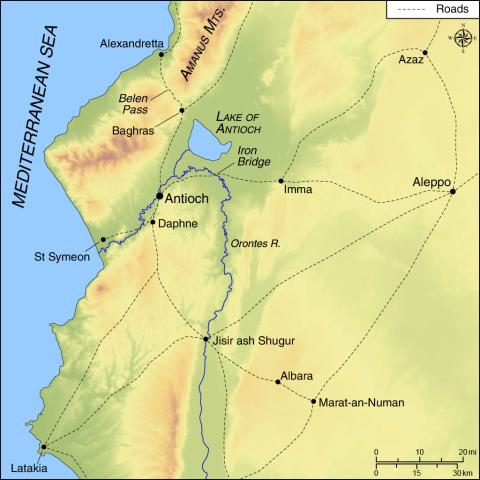The Lake Battle
[6.17.1] Itaque, audiēns dominus Boamundus innumerābilem gentem Turcōrum venientem super nōs, cautē vēnit ad aliōs, dīcēns: “Seniōrēs et prūdentissimī mīlitēs, quid factūrī erimus? Nōs namque tantī nōn sumus ut in duābus partibus pugnāre valeāmus. Sed scītis quid faciēmus? Faciāmus ex nōbīs duās partēs. Pars peditum remaneat iūgiter cūstōdīre pāpiliōnēs, et quīlibet nimis obsistere hīs quī in cīvitāte sunt. Alia vērō pars mīlitum nōbīscum veniat obviam inimīcīs nostrīs, quī hīc hospitātī sunt prope nōs, in castellō Aregh ultrā pontem Farreum.”
[6.17.2] Sērō autem factō, exiit ē tentōriīs vir prūdēns Boamundus cum aliīs prūdentissimīs mīlitibus, īvitque iacēre inter flūmen et lacum. Summō dīlūculō iussit prōtinus explōrātōrēs exīre et vidēre quot sunt Turcōrum turmae, et ubi sint, aut certē quid agant. Exiērunt illī, coepēruntque subtīliter inquīrere, ubi essent aciēs Turcōrum reconditae. Vīdērunt tandem Turcōs innumerābilēs sēgregātōs venīre ex parte flūminis, dīvīsōs per duās aciēs; maxima vērō virtūs illōrum veniēbat retrō. Reversī sunt namque celeriter speculātōrēs, dīcentēs: “Ecce, ecce veniunt! Igitur estōte omnēs parātī, quia iam prope nōs sunt.” Dīxitque vir sapiēns Boamundus aliīs: “Seniōrēs et invictissimī mīlitēs, ordināte adinvicem bellum.” Respondēruntque illī: “Tū sapiēns et prūdēns, tū magnus et magnificus, tū fortis et victor, tū bellōrum arbiter et certāminum iūdex: hoc tōtum fac; hoc tōtum super tē sit. Omne bonum quod tibi vidētur, nōbīs et tibi operāre et fac.”
notes
vocabulary
6.17.1
iūgiter: (CL) continually; (ML) all together, in a body
quīlibet quaelibet quodlibet: each one (ML)
nimis: to an unbelievable extent, very much (OLD 3)
6.17.2
turma –ae, f.: squadron (of cavalry)
virtūs virtūtis, f.: strength, i.e., “largest part”
namque: for (CL); but (ML)
prope: (prep. + acc.) near
adinvicem: one after another, by turns
super: (prep. + acc.) in authority over, in charge of (OLD 9)

